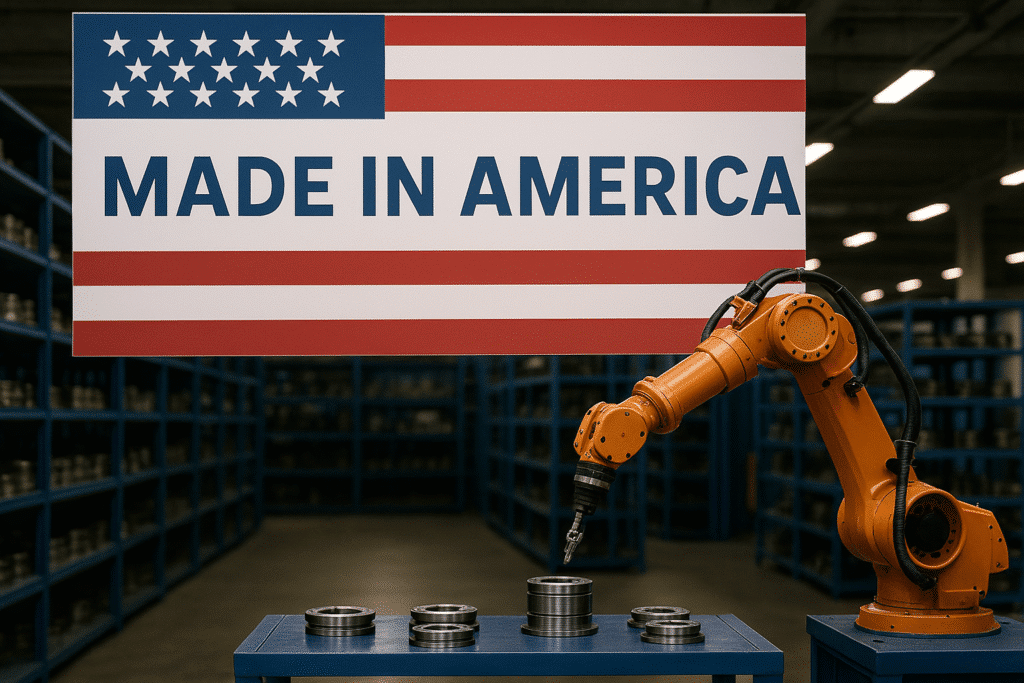Silicon Valley’s right-leaning tech elite is increasingly rallying behind former President Donald Trump’s ambition to bring advanced manufacturing back to the U.S.—a modern reboot of the “Made in America” ethos centered on national security and innovation.
At the Reindustrialise Summit in Detroit, tech pioneers such as Palmer Luckey, founder of Anduril, presented bold proposals: Luckey lauded the technical feasibility of manufacturing entirely U.S.-made computers—even with a potentially 20% price premium—and urged others to step up if his company didn’t. Meanwhile, VCs including Marc Andreessen and executives from automation firms envisioned domestic build-out of robotics, drones, and AI tools—“manufacturing of the future” that could redefine the U.S. industrial base.
These sentiments echo broader concerns: the COVID‑19 supply chain disruptions, a need to reduce reliance on China, and fears over global AI competition. Trump’s vision, backed by plans for $92 billion in AI and energy infrastructure investment, resonates with technologists who see reshoring as both strategic and ethical.
Why Tech Leaders Are On Board
National Security & Strategic Supply Chains
Silicon Valley’s libertarian-leaning figures now see manufacturing as inseparable from U.S. sovereignty—especially in defense and AI-critical components.
Future-Focused Industrialism
Rather than reviving labor‑intensive factories, the emphasis is on automated robotics, drones, and intelligent systems—sectors with high ROI potential despite domestic wage premiums.
A Policy Ecosystem to Favor Innovation
Trump’s AI Action Plan proposes regulatory rollbacks, streamlined export policies, and incentives for energy‑heavy infrastructure. Tech giants like Nvidia and AMD have voiced strong support, noting the plan aligns with their roadmap for U.S. competitiveness.
Key Figures Driving the Alliance
- Palmer Luckey (Anduril): Pushing the feasibility of fully U.S.-made personal computers, anchored in national security logic and supply chain control.
- Marc Andreessen & Peter Thiel-linked VC networks: Connecting elite Silicon Valley dollars to conservative causes and institutional efforts to reshape industrial policy.
- David Sacks: Recently appointed as Trump’s AI & Crypto “czar,” wielding influence over digital regulation and bridging gaps between Silicon Valley and Washington.
- JD Vance: As Vice President and a mediator between MAGA populism and tech libertarianism, Vance ties together conservative financial networks and policy direction.
Implications for Spring Manufacturers & Suppliers
- Opportunity for Reshoring Technology Components
If national policy prioritizes domestic advanced manufacturing—including electronics, robotics, and AI gear—suppliers that build precision metal parts, machined components, or automation systems could see demand growth. - Elevated Standards & Supply Chain Visibility
Expect increased compliance expectations for local sourcing, traceability, and traceable materials—especially contracts tied to defense or federal programs. - Potential Shifts in Labor and Energy Infrastructure
With energy-intensive AI/data center projects on the horizon, the infrastructure around manufacturing—power reliability, local workforce training—will matter more than ever. - Market for Hybrid Products
Spring producers could position themselves as high-quality contributors to “Made in America” assemblies, leveraging vertical integration with robotics or defense suppliers.
Bottom Line
Silicon Valley’s tech-nationalist movement is lending substantial momentum to Trump’s vision: a U.S. industrial revival built for the AI era, secure supply chains, and global competitiveness. Although domestic production comes with higher costs, the spirit driving this movement emphasizes “strategic autonomy” over margin compression. For Jackson Spring and supply chain partners, this moment represents an inflection toward higher-value, policy-aligned manufacturing opportunities.

